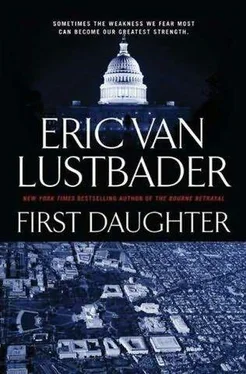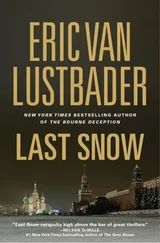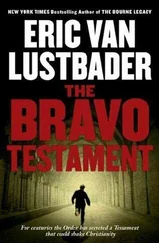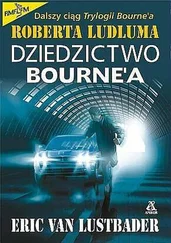WHEN DENNIS Paull exited the Pentagon, he pulled out his cell phone, punched in a speed-dial number, said, "Latent," and rang off. A moment later, he ducked into his limo, which took him to the nearby Nordstrom department store. Paull strode inside, went immediately to the men's store. There, he spotted two of his men. While the first one covered his back, checking for tails, Paull went up to the second agent, took the large shopping bag out of his hand, proceeded to the entrance to the dressing rooms, outside of which another of his agents stood guard.
Inside, only one booth was occupied. Paull chose an adjacent booth, spent the next four minutes stripping off his fedora, midnight-blue cashmere overcoat, Brooks Brothers suit, Paul Stuart shirt and tie. He put his black brogues aside. From the shopping bag, he donned a pair of stovepipe-leg jeans, a blue chambray shirt, a pair of brown Lucchese cowboy boots.
Thus dressed, gripping a dossier he'd extracted from inside his overcoat, he knocked on the dividing wall between his booth and the other occupied booth. The fourth of his agents appeared with a brown shearling coat and a dun-colored Stetson for Paull. As the secretary vacated his booth, his agent, who was the same weight and height as Paull, entered, dressed himself in his boss's clothes. He was the one who exited Nordstrom by the same doors Paull had used to enter. He climbed into Paull's limo, which whisked him away. At the same time, Paull took a side door out to the mall, where an Empire taxi idled, waiting for him, its driver one of Paull's agents.
The taxi took off as soon as Paull climbed in, swinging onto Washington Boulevard, heading toward Arlington. On the corner of Fourteenth and North Wayne, Paull got out, walked around the block to make sure he was clear, then went up North Adams Street. Just past where it crossed Fifteenth, a Metro Police car sat waiting. Paull opened the rear door, got in.
"All clear," Paull said. "Do you have any news?"
"Yes, sir." The agent dressed as a cop nodded. "The captain of your boat reads lips."
"Damn it to hell!" Paull's fist struck the armrest. "Who's he reporting to?"
"It's a mobile number we can't get a handle on."
"That figures." He thought a moment. "How about a date and time the call was made?"
"That I can do," his agent said, then gave the information to him.
Paull stared out the window at the civilians hurrying past him on errands to buy fish or pick up flowers. Little People, the National Security Advisor called them, with an arrogance typical of this president's Administration. Of course, Paull himself was a member of the Administration, but right now he felt like a rat in the woodwork who suspected a slew of tomcats were waiting to snap off his head the moment he poked it into the open. "This is beautiful. Just beautiful."
He nodded. "Okay, let's get going." And he opened the thin dossier, reading it one more time and wondering at the paucity of genuine information on Ian Brady, the government's own crown jewel asset. But even in these few paragraphs, there was something for him, he was certain of it-trouble was, he was damned if he knew what it was.
HOWDY, COWBOY," Nina Miller said when he picked her up in the shadows of North Taft Street.
Paull shifted over. "I do look a sight, don't I?"
She tossed his Stetson onto the front seat. As she settled herself beside him, he said, "We've got a problem."
"Another one," she inquired, "or the same one?"
That made him laugh, despite his foul mood. "I think all our problems devolve back to one person."
"I only wish it was Hugh Garner," Nina said. "Him I can handle."
"He needs decommissioning, that's for certain," Paull acknowledged. "Any ideas on that score?"
"Jack told me he practically drowned Peter Link, one of the heads of the FASR. He would've done the same to Chris Armitage if Jack hadn't stepped in."
"Forget it. The president just ordered the arrest and interrogation of all FASR members."
"Then it's begun."
Paull nodded grimly. "Despite all our efforts."
"Jack's, too. He intervened, stood up to Garner to stop the torture by threatening to call the president-elect. It was no idle threat, and Hugh knew it, so he backed down. But now he hates Jack's guts."
"All useful bona fides," Paull said thoughtfully. "Is Jack one of us?"
Nina made a waffling gesture with one hand. "I don't yet know whether he has a side. He seems to be the most apolitical person I've ever met. Systems-any system-are abhorrent to him."
"So what is he, then?" Paull asked.
"Actually," Nina said, "from all the evidence, I'd say he's a humanist."
Paull seemed lost in contemplation.
The police car had taken the Curtis Memorial Parkway and was now on the Francis Scott Key Bridge, heading into Georgetown. The early morning fog had lifted, revealing a high sky filled with sunlight. There was only a light breeze. Paull, who hated overheated vehicles, had rolled down his window partway. He enjoyed the crisp air on his face and neck.
"The problem," Paull said, his eyes half-closed against the wind, "is that despite all my high-tech efforts at security, I've been undone by a very low-tech methodology: lip-reading."
"Someone on your yacht?"
He nodded. "The fucking captain, of all people."
"Wasn't he properly vetted?"
Paull shot her a pitying look. "We're talking someone inside the White House, very high up. All the vetting in the world is useless against being turned by someone of that stature."
The car took M Street, then turned north on Rock Creek Parkway.
"Surely you don't believe that the president recruited him directly?"
"I do not," Paull said. The car pulled to the side of the road within Rock Creek Park. "Walk with me. The driver will pick us up at the food shack two miles on."
They climbed out of the car and began to walk. The police car was soon gone. Paull had left his ridiculous Stetson in the front seat. The sun was but a sheen behind the tissue of white clouds. Nina pulled the collar of her peacoat up around her neck; Paull jammed his hands in his pockets as they set off together, surrounded by trees and brush.
"I've been thinking hard about your question," Paull said. "No, the president is too wily to initiate anything against me on his own. I'm not even certain that he's aware of the death of those two men who were following Jack to protect him. Therefore, he has to have a middle man."
"You mean a hatchet man."
"Call him what you will, Nina, we have a very potent enemy in the Administration."
"It's imperative we know his identity, don't you think?"
Paull nodded. "I most certainly do. Because the president is involved, even if it's on a nontactical level, our man has to be either the Secretary of State or the National Security Advisor."
Nina shuddered. "I wouldn't want either of them as an enemy."
"I hear you," Paull acknowledged, "but that's the hand we've been dealt."
They were nearing a fork in the road, and he directed them to the right, along a high embankment. A stream glimmered dully below. Apart from a smattering of passing cars, there was no one about.
"The good news is that I've worked out which one it is," Paull continued. "The message the captain sent was on the same day you and I met on the yacht. The time was a few minutes after you left. At that time, the president was on his way to Moscow to meet with President Yukin. He could have taken the call himself, of course, but that seems unlikely. The president maintains a high level of plausible deniability by using selected intermediaries he deems expendable."
"Both the Secretary of State and the National Security Advisor were with him on Air Force One," Nina said.
"So they were, but only one of them has knowledge of-and therefore access to-a specific high-level asset. I'm this asset's handler, that's how important he is. He's abruptly dropped off the grid, he hasn't made his dead drops in months. However, I have reason to believe that as recently as last week, this particular asset has been in touch with someone else in the Administration. I am very much afraid this high-ranking official is using this asset-a murderer without a speck of conscience-for his own purposes."
Читать дальше












